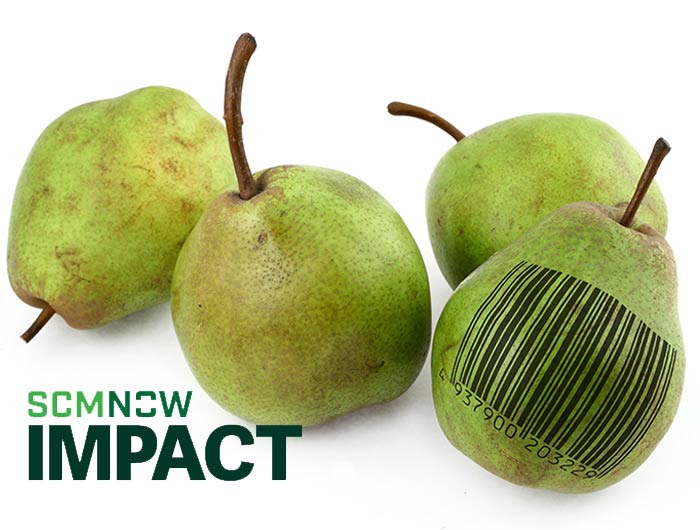Tracking and tracing products is an ongoing challenge for many supply chain professionals. Frank Yiannas, vice president of food safety at Wal-Mart Stores, shared with The New York Times his traceability woes when monitoring product movements from farm to shelf. This task becomes especially important when identifying instigator ingredients during salmonella outbreaks, he says. To ease Yiannas’s concerns, IBM reached out to Wal-Mart Stores with an intriguing digital solution—blockchain—that could make this process much easier.
You might have heard of blockchains as the digital ledger that keeps track of transactions made with the digital currency Bitcoin. A blockchain is a peer-to-peer ledger hosted on a decentralized network. This means that there is not one central authority that controls the system. Instead, users have their own copies of the ledger, and they run algorithms to verify new transactions. If someone tries to create a fraudulent transaction or delete an existing one, the other users would know and reject the change. In this way, users essentially police the system and create a secure record of transactions. Conversely, if the transaction makes sense when compared with previous transactions, it is added to the record for all to see.
IBM is working hard to put itself and its products at the forefront of blockchain solutions for supply chain. The company has already garnered 400 clients, including Wal-Mart Stores, who are testing the technology and has dedicated 650 of its own employees to the platform. But the Wal-Mart Stores partnership is IBM’s biggest blockchain test to date.
Last October, Wal-Mart Stores started using the technology to track a packaged produce item in the United States and pork in China, according to Bloomberg. Although the original test only focused on two products, it involved thousands of individual packages shipped to multiple stores. The system allowed the retail giant to “obtain crucial data from a single receipt” about an individual package, including information about the supplier, where and how the food was grown or made, and who inspected it, Bloomberg reports. Therefore, if a foodborne illness outbreak occurrs, Wal-Mart Stores will be better equipped to recall just the affected packages, which is preferable to removing entire inventories from their shelves.
Other companies also are catching on to IBM’s blockchain efforts. The New York Times reports that Maersk will soon announce its use of IBM’s blockchain to track the avocados, flowers, and machine parts it carries on its cargo ships. The government of Dubai also is working with IBM to trace the goods entering and exiting its ports.
Along with the benefits of tracking and tracing products, this digital platform could boost port efficiencies too. Maersk struggles with the mountains of paperwork that accompany each product it ships. A single container could require stamps and approvals from as many as 30 entities, including customs and tax officials and health authorities. If one of those pieces of paper goes missing, products could be tied up at ports for days and eventually spoil before ever reaching the end customer. As a result, the cost of managing the paperwork is almost as much as the cost of physically moving the container. And even if the bill of lading paperwork is present, it could be tampered with or fraudulent. Moving to a blockchain platform would reduce the amount of physical pieces of paper and ensure that all information is as accurate as possible.
Maersk already tested this system last year by tracking a shipment of flowers from Mombasa, Kenya, to Rotterdam, the Netherlands. Following success there, Maersk expanded the trials to track pineapples from Colombia and mandarin oranges from California.
Still, some are skeptical about using blockchains and are not convinced that the system offers efficiencies compared with existing track-and-trace methods. One hurdle is that everyone who touches a product has to be involved in the blockchain process, or the product history will be incomplete and no more reliable than previous, non-blockchain records. On the other hand, proponents argue that this technology is as significant as the invention of the internet. Blockchains, they say, could provide a universal language for collecting, storing, and sharing valuable information.
Ready with resiliency
As supply chain evolves, many disruptive technologies change the shape of business and the way we work. Consider the definition of supply chain resilience from the APICS Dictionary, 15th edition: “The ability of a supply chain to anticipate, create plans to avoid or mitigate, and/or to recover from disruptions to supply chain functionality.” Not only do we need to make sure our supply chains are resilient in the face of changes to the business landscape, but we as professionals need to be resilient too. We must adjust to new technologies, keep up-to-date with the latest trends and challenges, and be prepared to propel our businesses forward.
APICS offers a variety of certifications to help you do just that. Our newest certification, the APICS Certified in Logistics, Transportation and Distribution (CLTD), will help you learn about best practices in global supply chain logistics and use that information to positively impact your company’s bottom line. Professionals who earn the designation prove to their peers and employers that they have mastered logistics knowledge and concepts. Start your CLTD journey today at apics.org/cltd.

03.10.17


